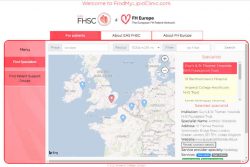Homozygous FH
What is Homozygous Familial Hypercholesterolemia (HoFH)?
HoFH is the rare and the most severe form of Familial Hypercholesterolemia (FH). Untreated, HoFH often causes heart disease (heart attacks and aortic valve disease) beginning in the early childhood. REMEMBER: while FH is common and impacts 1 person in 250, HoFH is a rare* disorder. It is estimated to affect as many as 1 in 300,000 people all over the world. As both forms are inherited, genetic conditions and as a result run in families. Therefore, once a patient with HoFH or FH is identified, all family members should be screened. Lives can be saved if it is identified and treated early.
HoFH happens when a child inherits two copies of an altered gene that causes FH, one from each parent. This is referred to as either compound heterozygous or homozygous FH (HoFH).
Because two FH causing genes are inherited this type of FH is more severe than heterozygous FH. The low-density lipoprotein cholesterol (LDL-C, “bad cholesterol”) level is typically over 4 times the normal level. They are usually higher than 12mmol/l or 400 mg/dL (measured in mmol/l in Europe and md/dL in the US). If it is not treated, it can cause heart disease at a very young age. It is particularly important that children with HoFH are diagnosed and treated early.
Homozygous FH is very rare and only happens if you inherit two copies of exactly the same gene alteration, one from each parent. In most cases the parents will have both inherited the original altered gene from a common ancestor. This type of FH appears to be more common in specific populations, such as French Canadians, Afrikaners in South Africa, or Christian Lebanese.
Worth knowing…
Compound heterozygous FH is rare and only occurs if you inherit two different types of gene alterations, one from each parent. These alterations may be different alterations in the same gene, or alterations in two of the three different genes associated with FH. This type of FH can only happen in a family where both parents have FH.
How is HoFH inherited?
HoFH is a family disorder and affects both children and adults. If both parents have FH, the probability of inheriting FH changes. There is:
- a one in two chance (50%) of inheriting HeFH (one altered gene);
- a one in four chance (25%) of inheriting HoFH (two altered genes) and
- a one in four chance (25%) of inheriting two normal (non-FH causing) genes
Learn more by viewing the FH Family Tree
What are the signs and symptoms of HoFH?
- Family history – HoFH is a family disorder. A person, who has HoFH has inherited two FH genes, one from each parent.
- High cholesterol – individuals with HoFH have low density lipoprotein cholesterol (LDLc) or “bad cholesterol” levels higher than 12mmol/l or 400 mg/dL (measured in mmol/l in Europe and md/dL in the US), and often much higher at birth.
- Xanthomas – are yellowish deposits cholesterol-rich fat, found under the skin. The bumps or lumps of excess cholesterol form around knuckles, elbows, and knees, or on the tendons of the hands, elbows, knees, and feet, particularly the Achilles tendon. They may be noticed by a dermatologist.
- Xanthelasmas – similarly to the above, are the cholesterol deposits under the skin around the eyes.
- Corneal Arcus – is a half-circle of grey, white, or yellow cholesterol deposits in the outer edge of the cornea.
REMEMBER: HoFH can be diagnosed with a simple blood test, a physical exam, and based on your family history (high cholesterol, premature CVD – cardiovascular disease, heart attack or stroke). The signs and symptoms of HoFH, including the level of LDL-C, vary from person to person. Only xanthelasmas, xanthomas, and corneal arcus are visible symptoms. HoFH may also be confirmed with genetic testing. Verify with your local patient support group and lipid specialist if genetic testing is available and reimbursed in your country.
HoFH Support
It is important to remember that HoFH is a serious and life-threatening medical condition. HoFH leads to progressive and early heart disease in both men and women, as well as children. Serious cholesterol deposits in the arteries or the aortic valve of the heart can cause heart attacks in people under the age of 10! That is why, if you or your child are diagnosed with HoFH, one of the first steps to take – as soon as possible – is to consult a lipid specialist, preferably one that treats HoFH. Because cholesterol levels are usually much higher and because statins may not always be effective in people with HoFH; other treatments to bring their cholesterol levels down sufficiently may be required.
HoFH Treatment
HoFH can be managed. Until recently, there were few treatment options for people who have HoFH. However, significant research in this area has led to some exciting new developments. There are multiple effective treatments for HoFH available today. For more specific information regarding the treatment access in your country please contact your local patient support group or medical specialist.
Many of the same treatments used to treat Familial Hypercholesterolemia can and are used to manage HoFH. However, HoFH patients will require even more intensive therapy to bring their LDL cholesterol (bad cholesterol) levels down. A combination of treatments is usually required to lower LDL-cholesterol. More information coming soon.
- Statins
- Ezetimibe
- Bile acid sequestrants
- PCSK9 inhibitors
- Lipoprotein Apheresis [list of European centres coming soon]
- Lomitapide
Additional therapies are in clinical trials and development. If you are interested in learning about a clinical trial in your area, please contact us or your local patient support group and or lipid specialist.
HoFH Healthy lifestyle support
This section is coming soon.
Find a Support Group
 FH Europe is a member organization of 25 patient organizations across Europe, supporting patients with Familial Hypercholesterolemia and other forms of inherited lipid conditions.
FH Europe is a member organization of 25 patient organizations across Europe, supporting patients with Familial Hypercholesterolemia and other forms of inherited lipid conditions.
Connect with your nearest patient group for more information and local support in your language. Find your FH patient organization here
Find a Lipid Specialist
 FH Europe partners with EAS FHSC – the global FH registry to provide you with FIndMyLipidClinic website. Find your lipid clinic here .
FH Europe partners with EAS FHSC – the global FH registry to provide you with FIndMyLipidClinic website. Find your lipid clinic here .
Contact your local specialist, who can provide further help with treatment and lifestyle changes. (This database was launched in 2020 and is being continuously updated to support you better. Available in most European languages soon).
FH Europe is supported by an educational grant from Amgen Limited, Sanofi, Regeneron, Akcea Therapeutics Inc. and Amryt
Site by: Vovi Web Design

